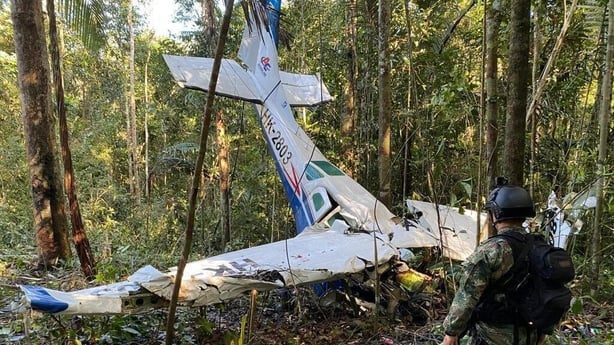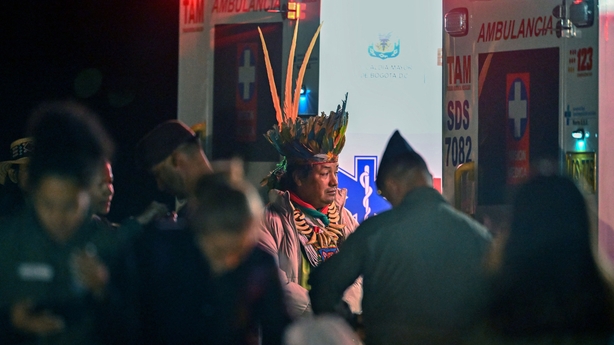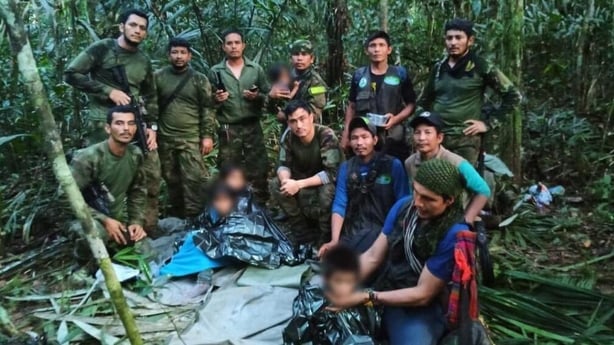Four Indigenous children who had been missing for more than a month in the Colombian Amazon rainforest were found alive and flown to the capital Bogota early this morning.
The children, who survived a small plane crash in the jungle, were transported by army medical plane to a military airport at around 12.30am (6.30am Irish time).
They were immediately taken off the plane on stretchers with ambulances waiting to bring them to hospital.
"Today we have had a magical day," President Gustavo Petro told the media yesterday, after announcing their rescue.
"They are weak. Let's let the doctors make their assessment," he added.
The president had posted a photo on Twitter showing several adults, some dressed in military fatigues, tending to the children as they sat on tarps in the jungle. One rescuer held a bottle to the mouth of the smallest child, whom he held in his arms.
"A joy for the whole country! The 4 children who were lost 40 days ago in the Colombian jungle were found alive," he wrote on Twitter.

Video shared by the Defense Ministry showed the children being pulled up into a helicopter as it hovered over the tall trees in almost complete darkness.
Originally from the Huitoto Indigenous group, the children - aged 13, nine, four and one - had been wandering alone in the jungle since 1 May, when the Cessna 206 in which they were traveling crashed.
The pilot had reported engine problems only minutes after taking off from a jungle area known as Araracuara on the 350km journey to the town of San Jose del Guaviare.
The bodies of the pilot, the children's mother and a local Indigenous leader were all found at the crash site, where the plane sat almost vertical in the trees.
Officials said that the group had been fleeing threats from members of an armed group.
A massive search involving 160 soldiers and 70 Indigenous people with intimate knowledge of the jungle was launched after the crash, garnering global attention.

The area is home to jaguars, snakes and other predators, as well as armed drug smuggling groups, but ongoing clues - footprints, a diaper, half-eaten fruit - led authorities to believe they were on the right track.
Worried that the children would continue wandering and become ever more difficult to locate, the air force dumped 10,000 flyers into the forest with instructions in Spanish and the children's own Indigenous language, telling them to stay put.
The leaflets also included survival tips, and the military dropped food parcels and bottled water.
Rescuers had also been broadcasting a message recorded by the children's grandmother, urging them not to move.
According to the military, rescuers found the children about five kilometers west of the crash site.
'Absolute survival'
Huitoto children learn hunting, fishing and gathering, and the kids' grandfather had said the children are well acquainted with the jungle.
News of the rescue came as Mr Petro returned home from Cuba, where he signed a six-month truce with Colombia's last active guerrilla group, the ELN.

"Getting closer and attaining peace in the agreement that is moving forward with the ELN... And now I return and the first news is that indeed the Indigenous communities that were in the search and the military forces found the children 40 days later," he told reporters in Bogota.
"They were alone, they made it on their own. An example of absolute survival that will go down in history," he said.
Mr Petro initially reported that children had been found on 17 May in a message on Twitter but later deleted the post, saying the information was unconfirmed.
Yesterday he praised "the effective coordination between the military and the Indigenous people" during the search, saying it was an "example of an alliance for the country to follow".
The children had been found by a native of Araracuara who had been participating in the search.
Defense Minister Ivan Velasquez paid tribute to the various army units' "unshakeable and tireless" work, as well as to the Indigenous people who took part in the search.
Army rescuers "immediately took charge of and stabilised" the four siblings, who were transferred to San Jose del Guaviare, according to the minister, and then later to Bogota.
